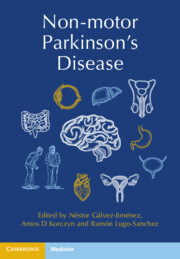Book contents
- Non-Motor Parkinson’s Disease
- Non-Motor Parkinson’s Disease
- Copyright page
- Contents
- Contributors
- Introduction
- Chapter 1 Parkinson’s Disease: An Overview of the Non-Motor Symptomatology
- Chapter 2 Evaluation of the Patient with Parkinson’s Disease in the Early Stages: Non-Motor Phase
- Chapter 3 Non-Motor Symptoms in Late-Stage Parkinson’s Disease
- Chapter 4 Neuropathology of Non-Motor Parkinson’s Disease Symptoms
- Chapter 5 Neuroimaging Studies in Non-Motor Parkinson’s Disease Symptoms
- Chapter 6 Mild Cognitive Impairment
- Chapter 7 Cognitive Dysfunction in Parkinson’s Disease
- Chapter 8 Neuropsychiatric (Behavioral) Symptoms in Parkinson’s Disease
- Chapter 9 Mood Disorders in Parkinson’s Disease
- Chapter 10 Olfactory Dysfunction in Parkinson’s Disease and Related Disorders
- Chapter 11 Oculomotor and Visual-Vestibular Disturbances in Parkinson’s Disease
- Chapter 12 Autonomic Dysfunction and Failure in Parkinson’s Disease
- Chapter 13 Gastrointestinal Disturbances in Parkinson’s Disease Including the Management of Sialorrhea
- Chapter 14 Sexual Dysfunction in Parkinson’s Disease
- Chapter 15 Sleep Disturbances in Parkinson’s Disease
- Chapter 16 Musculoskeletal Disorders and Pain in Parkinson’s Disease
- Chapter 17 Cutaneous Manifestations of Parkinson’s Disease
- Chapter 18 Genetics of Non-Motor Symptoms of Parkinson’s Disease
- Chapter 19 Drug-Induced Non-Motor Symptoms in Parkinson’s Disease
- Chapter 20 Impulse Control Disorders and the Dopamine Dysregulation Syndrome
- Chapter 21 Serotonin Syndrome and Drug Interactions, Hypertensive Complications, and, Adverse Effects of Monoamine Oxidase Inhibitors in Patients with Parkinson’s Disease
- Chapter 22 Parkinson’s Disease and Pregnancy
- Index
- Plate Section (PDF Only)
- References
Chapter 6 - Mild Cognitive Impairment
Published online by Cambridge University Press: 05 March 2022
- Non-Motor Parkinson’s Disease
- Non-Motor Parkinson’s Disease
- Copyright page
- Contents
- Contributors
- Introduction
- Chapter 1 Parkinson’s Disease: An Overview of the Non-Motor Symptomatology
- Chapter 2 Evaluation of the Patient with Parkinson’s Disease in the Early Stages: Non-Motor Phase
- Chapter 3 Non-Motor Symptoms in Late-Stage Parkinson’s Disease
- Chapter 4 Neuropathology of Non-Motor Parkinson’s Disease Symptoms
- Chapter 5 Neuroimaging Studies in Non-Motor Parkinson’s Disease Symptoms
- Chapter 6 Mild Cognitive Impairment
- Chapter 7 Cognitive Dysfunction in Parkinson’s Disease
- Chapter 8 Neuropsychiatric (Behavioral) Symptoms in Parkinson’s Disease
- Chapter 9 Mood Disorders in Parkinson’s Disease
- Chapter 10 Olfactory Dysfunction in Parkinson’s Disease and Related Disorders
- Chapter 11 Oculomotor and Visual-Vestibular Disturbances in Parkinson’s Disease
- Chapter 12 Autonomic Dysfunction and Failure in Parkinson’s Disease
- Chapter 13 Gastrointestinal Disturbances in Parkinson’s Disease Including the Management of Sialorrhea
- Chapter 14 Sexual Dysfunction in Parkinson’s Disease
- Chapter 15 Sleep Disturbances in Parkinson’s Disease
- Chapter 16 Musculoskeletal Disorders and Pain in Parkinson’s Disease
- Chapter 17 Cutaneous Manifestations of Parkinson’s Disease
- Chapter 18 Genetics of Non-Motor Symptoms of Parkinson’s Disease
- Chapter 19 Drug-Induced Non-Motor Symptoms in Parkinson’s Disease
- Chapter 20 Impulse Control Disorders and the Dopamine Dysregulation Syndrome
- Chapter 21 Serotonin Syndrome and Drug Interactions, Hypertensive Complications, and, Adverse Effects of Monoamine Oxidase Inhibitors in Patients with Parkinson’s Disease
- Chapter 22 Parkinson’s Disease and Pregnancy
- Index
- Plate Section (PDF Only)
- References
Summary
For many years Parkinson’s disease (PD) was regarded primarily as a motor disorder and attempts to discover treatments focused on therapies for rigidity, bradykinesia, and tremor. The brain pathology studies concentrated on the nigrostriatal pathways and dopamine. It was the success of the dopamine replacement therapies which opened the way to discuss the non-motor manifestations of the disease, particularly mental health manifestations and dementia.
Cognitive impairment is very frequent in PD and actually may eventually affect all patients if they live long enough [1], causing additional suffering to patients and caregivers. It is not clear what the anatomical basis of cognitive impairment is, but it is thought to reflect α-synuclein deposition in the cortex and particularly in the limbic system, although most PD patients also bear β-amyloid and TDP-43 deposits once they become demented.
- Type
- Chapter
- Information
- Non-motor Parkinson's Disease , pp. 62 - 65Publisher: Cambridge University PressPrint publication year: 2022



